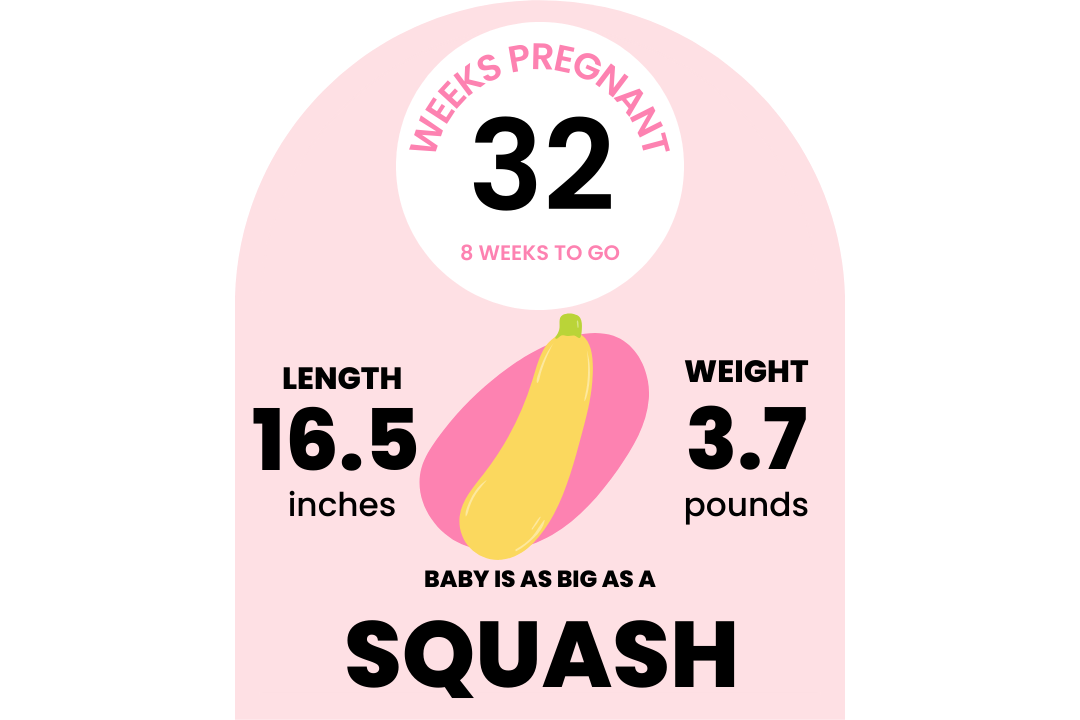
Baby’s growth and size
Your baby is somewhere between 16-17 inches long and weighs between 3.5-4 pounds.
What’s new developmentally?
Baby is spending the next 8 weeks practicing all the skills they need to live outside of your womb. Aside from baby’s lungs, all the major organs are developed and working.
Baby inhales and swallows amniotic fluid every day to give the lungs practice. By next month, baby’s lungs will be fully formed. The fat accumulating under baby’s skin is giving the skin a more opaque look instead of the see-through, transparent look.
Fun facts about your week 32 baby
- Baby has regular sleep and wake cycles
- Baby is storing important minerals such as iron, calcium, and phosphorus
- If you are having a baby girl, her ovaries are in place with all the eggs she’ll have
32 weeks pregnant symptoms not to ignore
There are a few things you should notify your OB provider about if they happen. I know I mentioned that mild swelling of your feet and ankles is normal in pregnancy but there are times that swelling can be a cause for concern. One thing you might be at risk for at 32 weeks, and really any point during pregnancy, is preeclampsia.
If your swelling is severe or if it is accompanied by a headache that won’t go away, vision changes, sudden weight gain, stomach, shoulder, or lower back pain, sudden nausea, or shortness of breath or chest pain, it could be something more serious going on and you need to be evaluated.
Other symptoms not to ignore include a decrease or change in fetal movement, any kind of vaginal bleeding, if you think your water might have broken, or an intuition that something might be off.
The last thing we want you to do is sit around your house and worry when you can easily be evaluated and have a peace of mind.
32 weeks pregnant baby born
32 weeks is considered preterm. According to ACOG, the governing body of obstetricians and gynecologists, term is actually broken down into three different categories early, full, and late.
You won’t be considered early term until you reach 37 weeks. Delivering a baby at term doesn’t necessarily guarantee anything in the way of health or complications, but we do know that giving birth to a preterm baby increases the potential for complications.
Sometimes preterm labor happens without any reason or warning. Some risk factors that can increase the risk of preterm labor include preterm birth in a previous pregnancy, having a short cervix early in pregnancy, previous gynecologic surgeries, certain lifestyle factors, or other complications in pregnancy.
Again, there are no guarantees as to how a baby born at 32 weeks will do but if they are delivered in a hospital where they can receive the specialized care, they need from NICU staff, there generally do pretty well, long-term.
As far as how long you can expect your baby to stay in the NICU, that will be individualized and depend on how well they can regulate their temperature, their ability to suck and swallow, and their weight gain.
You can expect baby to remain in the NICU until their due date, or close to their due date.
32 weeks pregnant ultrasound
While it’s not common to have an ultrasound done at 32 weeks, there are a few reasons why your provider might schedule one.
If you are experiencing any kind of complications or any conditions that make your pregnancy “high risk”, you might have an ultrasound this week. These high-risk conditions include but are not limited to carrying multiples, gestational diabetes, hypertension (high blood pressure), being over age 35 at the time of delivery, and other medical conditions.


.png?width=1500&height=300&name=logo%201500x300%20(1).png)


